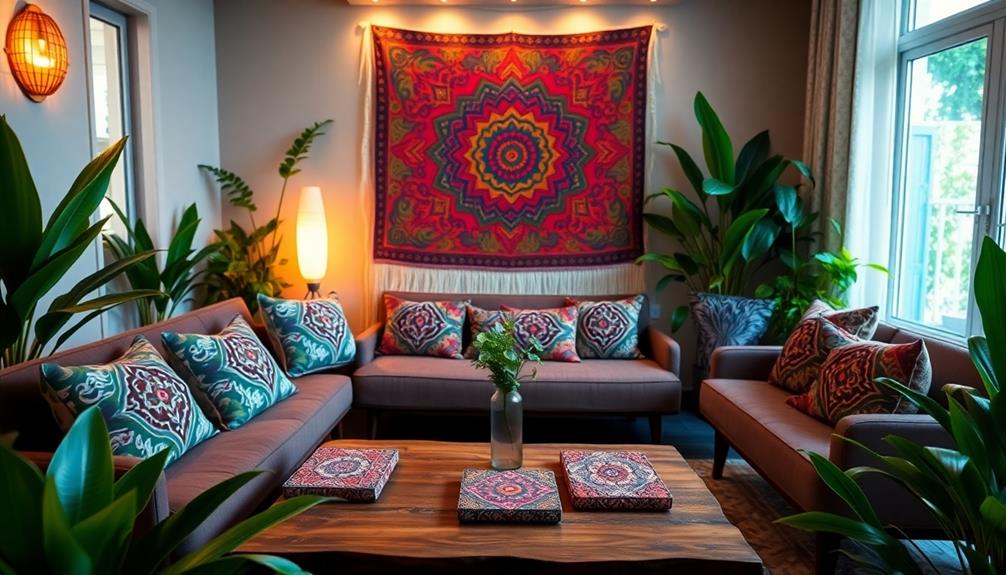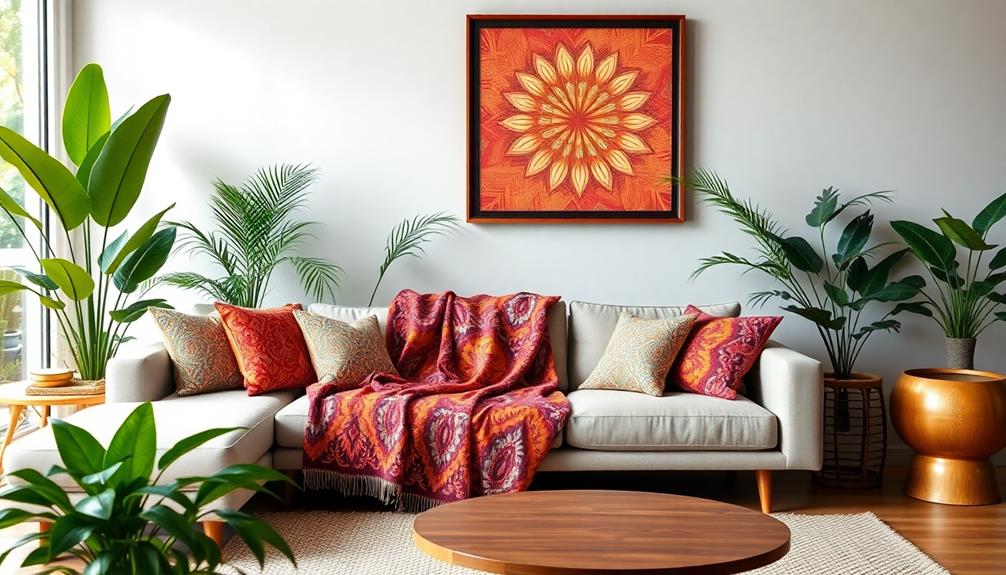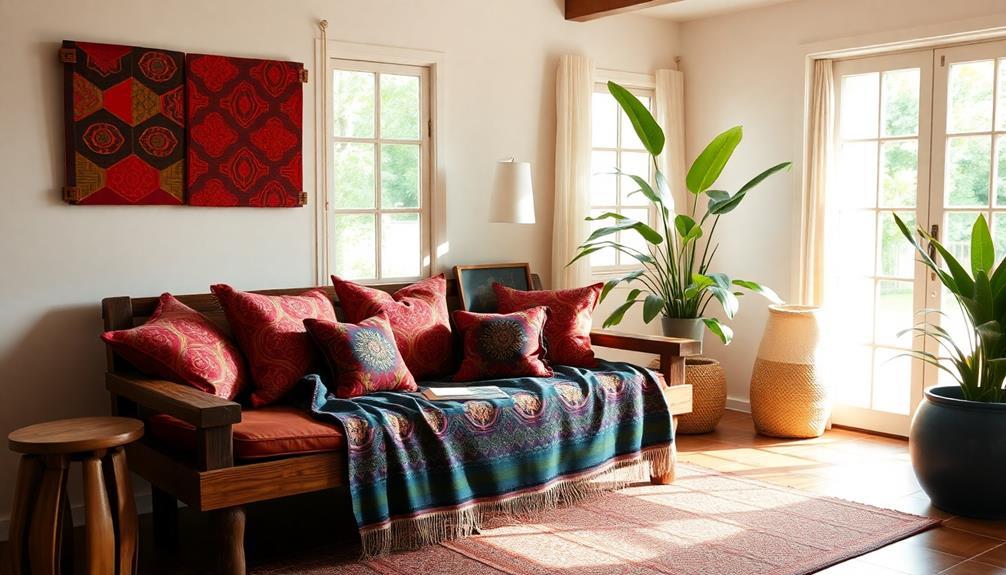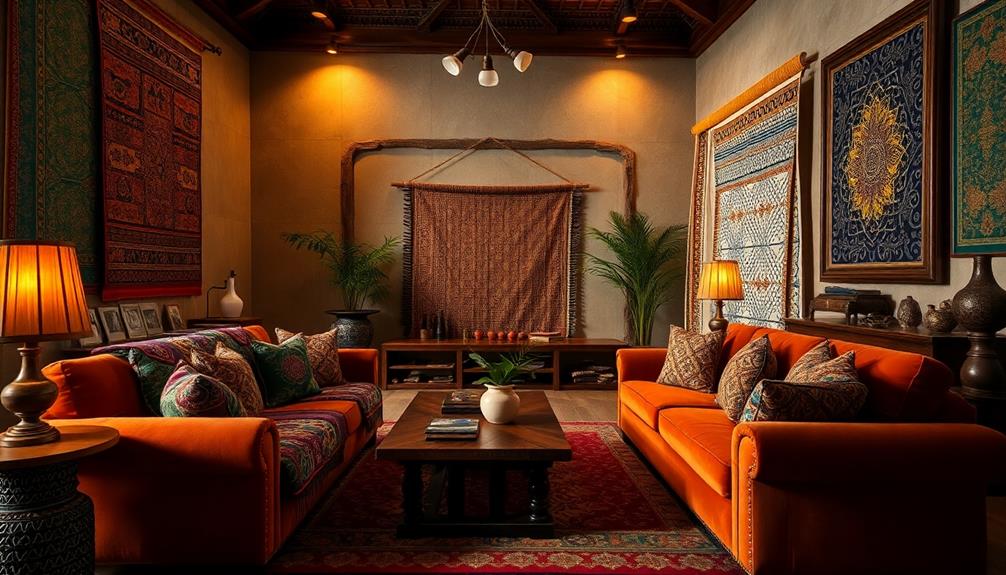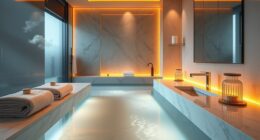To reveal the cultural beauty of batik in your home decor, start by incorporating vibrant batik cushions or table linens that showcase intricate patterns. Each piece tells a story, reflecting rich traditions and beliefs. You can hang batik wall art to create focal points that spark conversation and admiration. Mixing different styles can add a unique touch, connecting your space to Indonesia's diverse heritage. For a personal twist, explore DIY batik projects, such as custom pillows or wall hangings. Embracing batik not only enhances your decor but also enriches your understanding of its cultural significance, inviting you to explore further.
Key Takeaways
- Incorporate batik tablecloths and napkins to add vibrant cultural accents to dining areas while celebrating traditional craftsmanship.
- Create personalized gallery walls with framed batik fabric scraps, showcasing diverse patterns and enhancing your living space's aesthetic appeal.
- Use batik cushions and pillows to introduce texture and comfort, blending traditional designs with modern decor styles seamlessly.
- Craft DIY storage bins from batik fabric to combine functionality with cultural artistry, making organization stylish and meaningful.
- Choose authentic batik made from natural fibers, ensuring quality and supporting artisans while enriching your home decor's cultural significance.
Understanding Batik Fabric
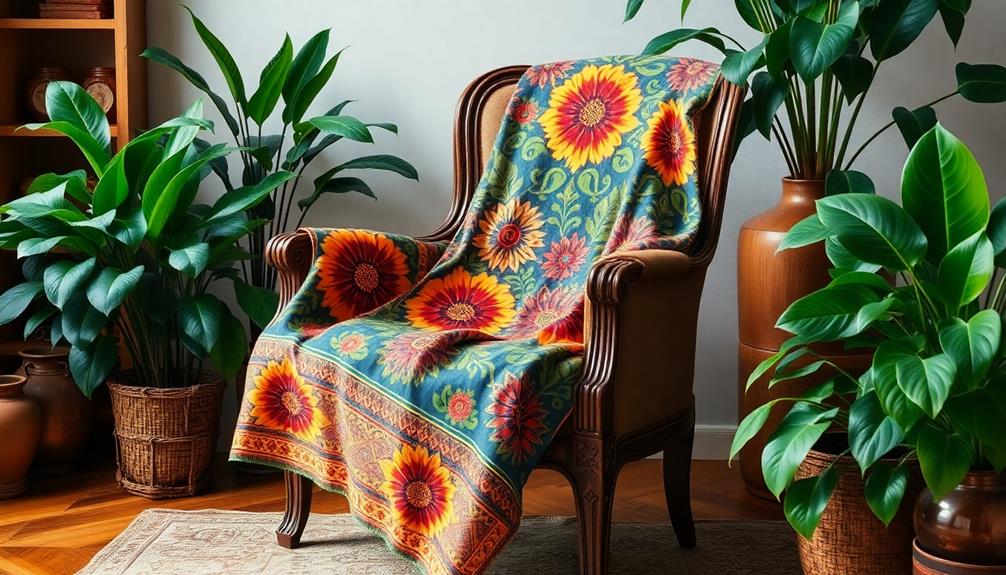
When you immerse yourself in the world of batik fabric, you'll discover a rich tapestry of tradition and artistry. Batik is created through a wax-resist dyeing technique, where areas covered in wax remain undyed, allowing the fabric to showcase intricate batik designs and vibrant colors. This unique method highlights the skills of the artisans who create these textiles, making each piece a true work of art.
Additionally, batik fabric can beautifully complement traditional artistry in Indonesian decor, enhancing the cultural depth of your home.
The term "batik" comes from the Javanese word "bathikan," meaning to draw or mark, underscoring the artistic process involved. Primarily made from natural fabrics like cotton and silk, batik provides a smooth canvas for applying designs using tools such as canting and copper stamps.
As you explore batik fabric, you'll find that each pattern carries cultural significance, often telling stories or representing beliefs and regional identities. Different Indonesian provinces boast distinct motifs, reflecting their unique heritage.
The production of batik involves multiple stages of dyeing and wax application, resulting in complex designs that celebrate the craftsmanship behind this beautiful textile. Understanding batik fabric enriches your appreciation for its role in home decor and cultural expression.
The Rich History of Batik
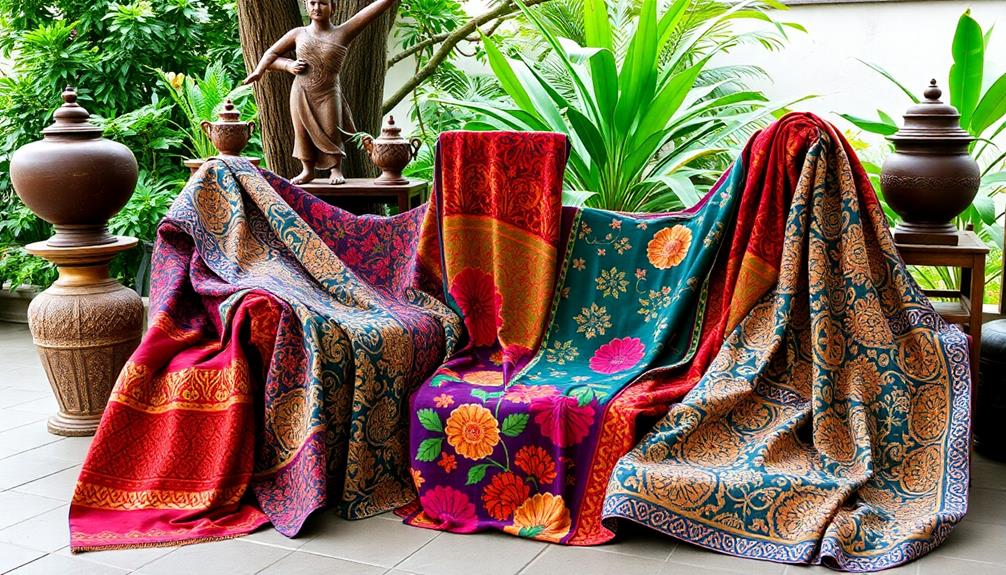
Batik embodies a rich history that speaks volumes about Indonesia's cultural heritage. Originating over 2000 years ago, batik stands as one of the oldest textile traditions in the world, showcasing intricate patterns and vibrant colors. The term "batik" comes from the Javanese word "bathikan," which means to draw or mark, perfectly reflecting the art's wax-resist dyeing technique.
The craft of batik isn't just a form of artistic expression; it also represents a deep appreciation for traditional craftsmanship.
UNESCO recognized batik as a Masterpiece of the Oral and Intangible Heritage of Humanity, underscoring its cultural significance and artistic value. Historically, batik motifs were closely linked to royal lineage, carrying deep meanings related to social status, nature, and local traditions, particularly in Javanese culture. This connection to heritage enriches your understanding and appreciation of batik.
Over centuries, the craft of batik has evolved, giving rise to regional styles, each with distinct designs and color palettes. This diversity further enhances its historical legacy, making it a crucial aspect of Indonesia's cultural narrative.
When you incorporate batik into your home decor, you're not just adding beauty; you're connecting with a rich tapestry of history that reflects the artistic spirit of a proud cultural heritage.
Cultural Significance of Batik
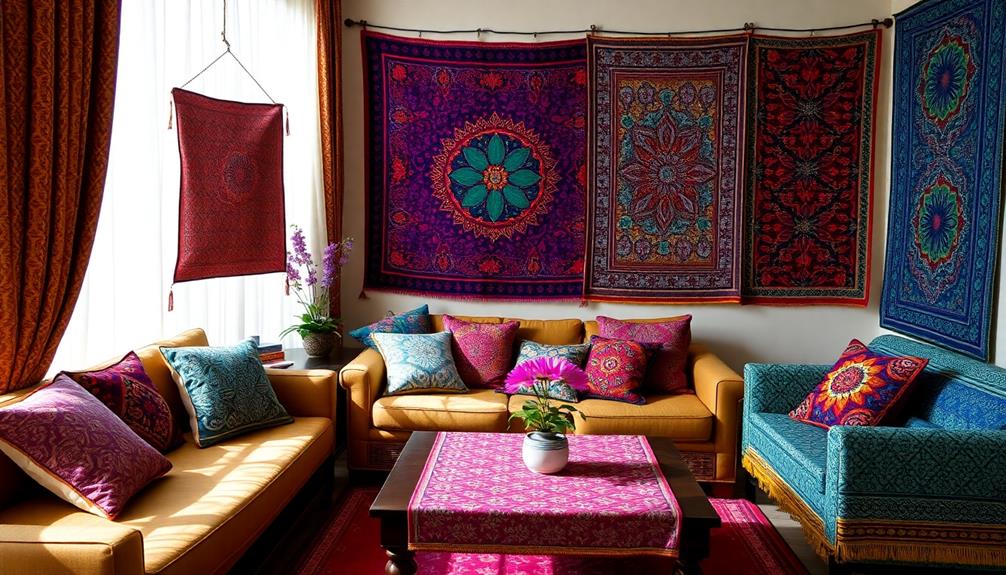
When you explore batik, you'll notice that each pattern holds a unique story, reflecting cultural beliefs and traditions.
These vibrant designs are often handcrafted from traditional fabrics and can enhance living spaces as decorative pillows or wall art.
Indonesian Decorative Pillows symbolize local heritage and also shape your understanding of identity across different regions.
Symbolic Patterns and Meanings
The intricate beauty of batik patterns unfolds a rich tapestry of cultural significance that resonates deeply within Indonesian society. As you explore beautiful batik designs, you'll discover that each pattern carries its own story, reflecting the beliefs and traditions unique to its region. For instance, the Parang pattern, often associated with power and bravery, symbolizes the strength of its wearers.
Additionally, batik motifs often showcase a connection to local myths and folklore, similar to the importance of Indonesian decor masks.
Many batik motifs showcase social status and virtues, particularly in Javanese culture, where specific designs were traditionally worn by royalty and during significant ceremonies. The Kawung pattern, with its distinctive four-circle design, represents fertility and prosperity, connecting the art of batik to the cultural narratives of the Indonesian people.
Moreover, each Indonesian region brings its own flair to batik styles and colors, enhancing the diversity of this art form. This variety not only enriches the aesthetics of your home decor but also serves as a vibrant representation of local identity and cultural heritage.
Embracing these symbolic patterns in your decor allows you to celebrate the profound meanings behind beautiful batik while infusing your space with a piece of Indonesia's rich cultural history.
Heritage and Identity Representation
In Indonesia, batik stands as a vibrant symbol of heritage and identity, weaving together the stories and traditions of its people. Recognized by UNESCO as a Masterpiece of the Oral and Intangible Heritage of Humanity, batik cloth tells tales of local beliefs and social statuses through intricate patterns.
Each design carries symbolic meanings, making it an essential medium for expressing cultural narratives and regional identities. The use of batik aligns with the broader appreciation for handcrafted items and artisanal crafts found in Southeast Asia Decor, enhancing its significance in contemporary decor.
When you incorporate batik into your home decor, you embrace this rich cultural tapestry. Here's how batik enhances your living space: The intricate patterns and vibrant colors of batik effortlessly add texture and visual interest to any room, whether used as wall hangings, throw pillows, or tablecloths. By combining both tradition and contemporary style, you can transform your home with batik, creating a unique, personalized ambiance that reflects your appreciation for global artistry. The timeless beauty of batik also fosters a warm, inviting atmosphere where culture and creativity intertwine.
- Artistic expression: The vibrant colors and intricate designs serve as eye-catching pieces that spark conversation.
- Cultural appreciation: Surrounding yourself with batik reinforces your connection to Indonesian heritage and traditions.
- Ceremonial significance: Using batik cloth in your decor reflects its roots in traditional practices and social events.
Types of Batik Techniques
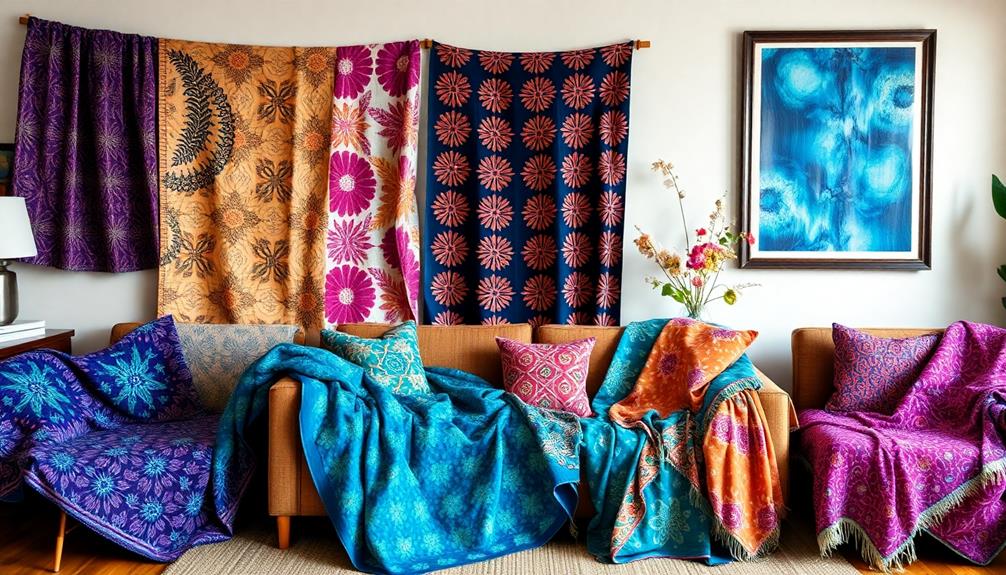
Batik techniques showcase a rich tapestry of artistry that transforms fabric into stunning works of art. You can explore various methods, each offering unique batik designs and characteristics. Traditional Indonesian housing, often adorned with batik elements, reflects the cultural significance of these art forms in everyday life, highlighting the cultural symbolism in housing.
First, there's Batik Tulis, where artisans hand-draw intricate patterns using a canting tool. This labor-intensive technique results in unique, highly detailed batik cloths that carry a personal touch.
On the other hand, Batik Cap utilizes copper stamps to apply wax, allowing for faster production and uniform designs without sacrificing cultural significance recognized by UNESCO.
If you're looking for something modern, consider Batik Lukis. This technique uses painting on undyed fabric, giving you more creative freedom and contemporary interpretations of traditional batik.
Another vibrant option is Batik Pesisir, known for its bright colors influenced by foreign trade, setting it apart from other styles.
Lastly, Batik Belanda blends Western and Javanese design elements, showcasing batik's adaptability in a global context.
Each technique offers a different perspective on batik artistry, allowing you to appreciate the diverse heritage behind these beautiful batik cloths.
Incorporating Batik in Home Decor
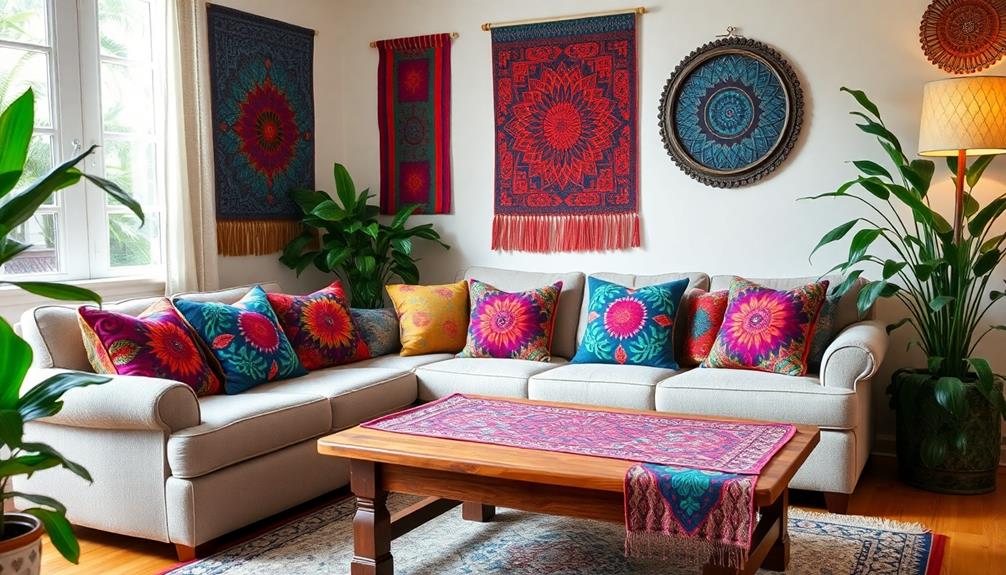
Incorporating batik into home decor brings a vibrant touch that celebrates cultural heritage while enhancing your living spaces. This traditional Indonesian textile can harmoniously blend with various design styles, such as traditional Indonesian style home decor, creating a unique atmosphere that reflects your style.
You can easily integrate batik designs through various textiles and accessories. Here are some ideas to get you started:
- Batik Table Settings: Use batik tablecloths, matching napkins, and coasters to create a cohesive design, perfect for cultural-themed gatherings. This adds elegance to your dining area.
- Cushion Covers and Pillows: Mix and match different batik patterns in your cushions and pillows. Not only do they provide comfort, but they also introduce texture and visual interest to your living spaces.
- Wall Art: Frame fabric scraps or batik pieces to design a personalized gallery wall. This celebrates traditional Indonesian craftsmanship while showcasing your creativity.
Creative DIY Batik Projects
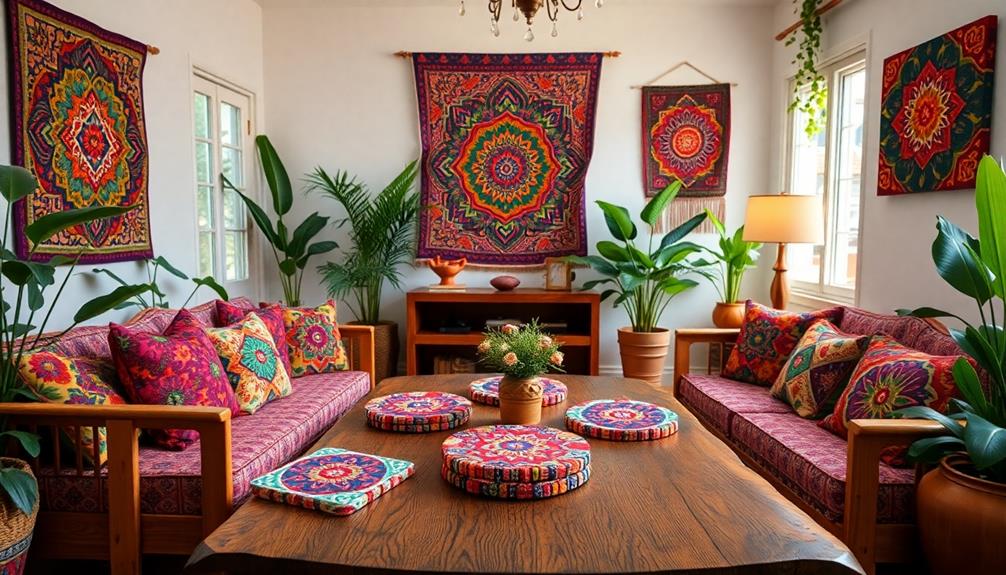
Plunge into the world of creative DIY batik projects that not only showcase your artistic flair but also celebrate the rich cultural heritage of this stunning textile. With vibrant colors and intricate batik designs, you can transform your living space into a haven of creativity and tradition. Here are some inspiring project ideas:
| Project Idea | Description | Benefits |
|---|---|---|
| Wall Hangings | Frame fabric scraps or batik pieces | Adds cultural flair |
| Batik Table Settings | Create tablecloths, napkins, and coasters | Enhances dining experience |
| Batik Pillows and Cushions | Sew or cover cushions with mixed batik fabrics | Adds texture and comfort |
| DIY Storage Bins | Craft bins using batik fabric for organization | Functional and stylish |
Experiment with creating batik-inspired lampshades or wall decals to introduce unique lighting and decor. Each project not only beautifies your home but also pays homage to the artistry of batik. Let your creativity flow, and enjoy the process of bringing these vibrant colors and stunning designs into your living spaces!
Choosing Quality Batik Fabrics
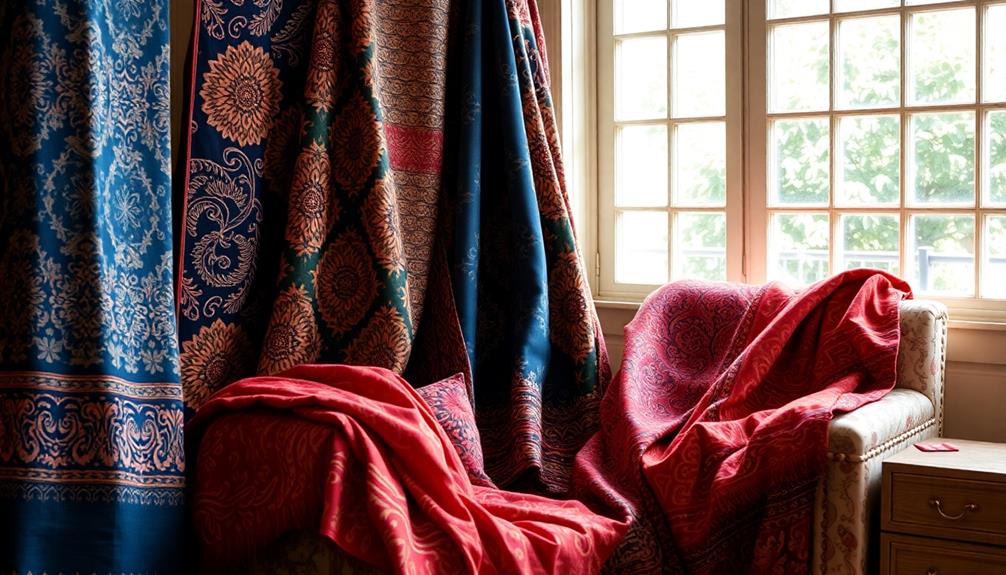
When you're choosing batik fabrics, focus on identifying authentic options that feature high-quality materials like 100% cotton or silk.
It's also beneficial to explore how batik patterns can be incorporated into various types of decor, such as table linens or wall hangings, to celebrate the richness of Indonesian culture traditional batik patterns.
Pay attention to the color and patterns; rich hues and detailed designs indicate superior craftsmanship.
Identifying Authentic Batik Fabrics
Choosing authentic batik fabrics for your home decor can elevate your space with rich cultural significance and unique artistry. To identify genuine pieces, keep these key points in mind:
– Material Matters: Authentic batik fabrics are often crafted from natural materials like cotton or silk, guaranteeing quality and durability.
Many local artisans in Bali create these exquisite fabrics, showcasing their craftsmanship and cultural heritage, which can be found at top shopping destinations for Balinese furniture and decor.
- Intricate Designs: Look for intricate hand-drawn designs known as Batik Tulis or stamped patterns (Batik Cap). These techniques reflect traditional craftsmanship and signify a higher quality.
- Color and Texture: A clear, crisp color contrast in the designs indicates proper dyeing using wax-resist techniques. The fabric should feel soft and pleasant, without harsh chemical odors.
When you shop, choose reputable sellers who provide information about the origins and production methods of their fabrics.
This not only assures that you're getting authentic batik fabrics but also supports the artisans behind the beautiful batik painting.
Color and Pattern Selection
In the world of batik fabrics, selecting the right colors and patterns can greatly enhance your home decor. Start by considering the traditional colors that resonate with specific regions. For instance, dark red and indigo blue are often associated with Indonesian batik, reflecting deep cultural significance.
To create a harmonious environment, you might consider incorporating elements of tropical contemporary design that complement the vibrancy of batik. When it comes to material, opt for high-quality cotton or silk, as these fabrics boost the vibrancy of batik patterns and guarantee durability in your decor.
Next, pay attention to the intricacy of the designs. Hand-drawn batik, or batik tulis, requires more labor and is typically regarded as superior to stamped batik, or batik cap. This choice not only elevates your decor but also showcases craftsmanship.
Aim for iconic patterns like Parang and Kawung, which not only beautify your space but also serve as conversation starters due to their rich cultural meanings.
Lastly, choose batik fabrics that have been ethically sourced. Supporting traditional artisans assures the authenticity and quality of your textiles, making your home decor not only beautiful but meaningful.
Global Influence of Batik Today
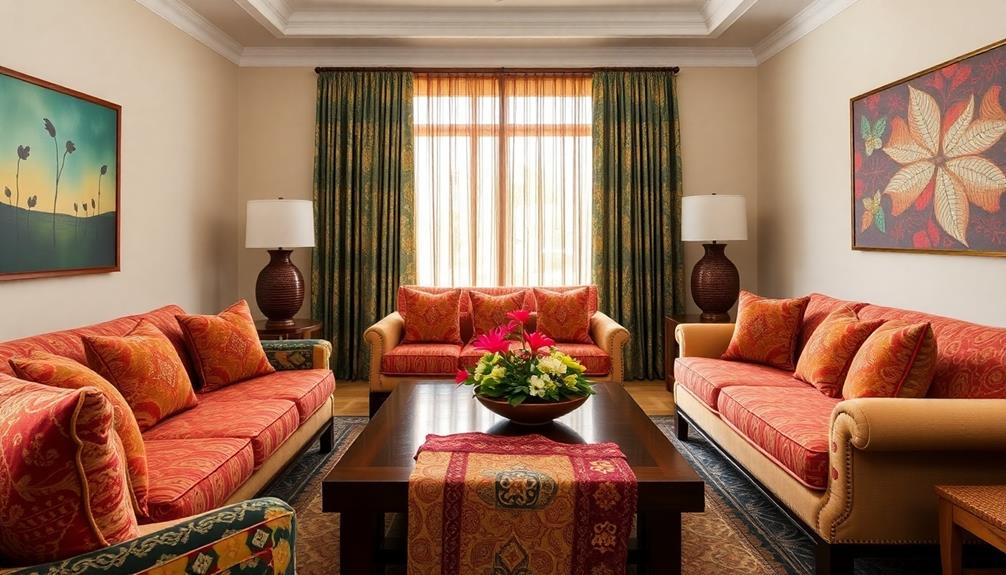
Batik has truly made its mark on the global stage, transcending its origins to become a beloved textile across cultures. Its journey began in the 19th century when European traders popularized batik, leading to its exhibition at international fairs and an increasing demand worldwide.
Today, you can find batik wall hangings and fabrics in homes that reflect a blend of different cultures. The influence of batik in contemporary design is undeniable:
- Fashion designers like Chitra Subyaktos modernize batik, attracting younger audiences with fresh styles.
- Luxury brands now incorporate batik-inspired fabrics into their home decor collections, allowing you to enjoy this cultural beauty without sourcing directly from traditional regions.
- Batik's presence in designer show houses highlights its versatility and lasting appeal in both fashion and home decor.
As you explore incorporating batik into your living space, remember that it's not just about the aesthetics; it's about celebrating the rich heritage that these textiles represent.
With batik, you can create a unique atmosphere that honors tradition while embracing modernity.
Frequently Asked Questions
What Is the Culture Behind Batik?
Batik's culture is rich and vibrant, reflecting social status, nature, and history through intricate patterns. You'll discover deep connections to ceremonies and traditions, as each design tells a unique story from its region.
What Does Batik Symbolize?
When it comes to batik, you're really getting a tapestry of culture. It symbolizes heritage, power, and virtues, telling stories through intricate patterns that connect you to the history and identity of a community.
How to Batik at Home?
To batik at home, choose your fabric, sketch a design, and apply wax. Use natural dyes in layers, letting each dry. Finally, remove the wax, wash, and iron your vibrant creation for a beautiful finish.
What Are the 5 Major Types of Batik Design?
Imagine a vibrant tapestry unfolding before you. The five major types of batik design are Batik Tulis, Batik Cap, Batik Lukis, Batik Pesisir, and Batik Belanda, each telling a unique story through intricate artistry.
Conclusion
Incorporating batik into your home decor not only enhances your space but also connects you to a rich cultural heritage. Did you know that over 50 countries have their own unique batik styles? By choosing quality fabrics and exploring creative DIY projects, you can celebrate this art form while adding a personal touch to your home. Embrace the vibrant patterns and stories behind batik, and let your decor reflect the beauty and significance of this timeless craft.

